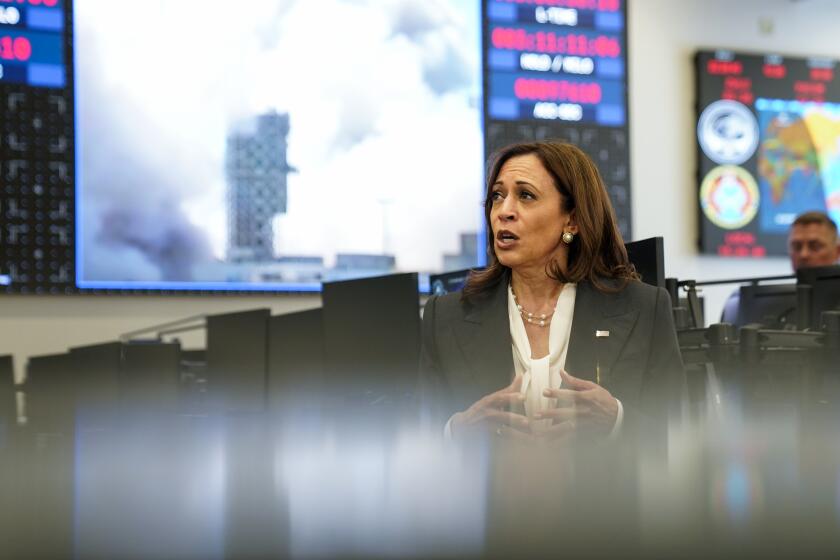News Analysis: Harris turns to maternal health in California as the White House struggles on midterm message

- Share via
Vice President Kamala Harris is scheduled to return to her hometown of San Francisco on Thursday to highlight her longtime focus on maternal health, capping a quiet week in California as the White House is grappling with how to sell its policies ahead of a bruising midterm election season.
The long stretch away from Washington may be a welcome reprieve for Harris but risks looking disconnected from the bleak outlook at the White House, which is struggling to address rising inflation and high gas prices, issues that are central to voters.
Still, the California visit provides some political upside for Harris, offering an opportunity to talk about something that resonate with the Democratic base.
“We should be talking about healthcare more. It is our best economic issue,” said Celinda Lake, a veteran Democratic pollster. “It is on people’s minds, not just as rising costs, but in terms of access, price gouging, cancer.… There are a lot of different angles to it.”
Vice President Kamala Harris says the U.S. will halt tests of anti-satellite missiles. The move follows a Russian test in November that blew up a satellite and polluted low-Earth orbit with more than 1,000 pieces of debris.
Vice presidents have historically struggled with establishing an independent identity while supporting the president’s policies. Harris is no exception, and she has taken on two tough assignments — addressing the root causes of migration in Central America and pushing back on voting restrictions in Republican-controlled states. The White House has failed to make much progress in either endeavor, and Harris has sought to engage in other policy areas that she‘s versed in, such as maternal health.
Harris has advocated throughout her political career to improve healthcare for expectant mothers. As a senator, she sponsored bills that would give incentives for improving maternal outcomes and training doctors about implicit racial bias, which contributes to higher mortality rates for women of color during pregnancy and delivery. Last week, Harris held the administration’s first Cabinet-level meeting on efforts to improve outcomes for pregnant women.
For the vice president, who sometimes appears scripted during public appearances, the chance to discuss the administration’s work on maternal mortality rates is a low-risk opportunity to demonstrate policy fluency on a topic that is especially meaningful to Democratic core voters such as Black women.
“It is an initiative in which she has a substantial amount of history, a tremendous amount of personal interest,” said Nathan Barankin, who served as chief of staff to Harris when she was a senator and California’s attorney general. That is true of her other assignments, he said, but “the distinguishing feature about this one ... this is not one that is mired in decades-long partisan fights.”
Tamara King was 28 weeks pregnant when a blinding headache took hold.
The maternal healthcare event on Thursday will feature a speech by Harris after she tours a UC San Francisco health facility and meets with expecting families and healthcare workers. She will be joined by Centers for Medicare and Medicaid Services Administrator Chiquita Brooks-LaSure and San Francisco Mayor London Breed, according to a White House official.
Not unlike President Biden, who makes frequent jaunts to his native Delaware, Harris also appears to be seeking the comforts of home. The vice president arrived Monday in California, delivering a speech at Vandenberg Space Force Base before attending a political fundraiser in Los Angeles. Harris enjoyed two days free of public events in Los Angeles. The vice president, who grew up in the Bay Area, and her husband, Second Gentleman Douglas Emhoff, have a home in Brentwood.
At a time when Americans are frustrated by rising prices and concerned about crime, however, Harris’ trip to California with a focus on maternal health could be seen a a missed chance to speak to the issues on the forefront of voters’ minds.
“It strikes me like playing not to lose rather than play to win,” said Whit Ayres, a Republican pollster. “Sending her to places she knows well, dealing with issues that she knows well but may very well not be voting issues, while ignoring parts of her portfolio that are an open bleeding wound for Democrats, like the border right now.”
Biden and members of his administration have fanned out across the country to convince voters he’s made enough progress on issues like infrastructure and the COVID-19 pandemic despite falling short on larger domestic promises. Harris has also crisscrossed the country highlighting the administration’s programs and legislative accomplishments.
Despite those efforts, they are getting drubbed in the polls — even in her own deep-blue California. A new UC Berkley Institute of Governmental Studies poll found respondents continue to see Harris more negatively than positively, with 35% of voters approving of her performance and 45% disapproving. In the same survey, which was co-sponsored by the Los Angeles Times, 50% of California voters approved of Biden while 46% disapproved, a minor improvement for the president since February, when the previous IGS poll was conducted.
Democratic pollsters, however, contend maternal healthcare and related issues are good campaign fodder. Lake, the Democratic pollster, pointed to the the 2018 midterm elections, when a focus on healthcare helped Democrats win back control of the House of Representatives.
Healthcare is the top issue for Democratic voters ahead of the midterms, with 74% saying it’s very important to their vote, according to a Pew Research Center survey released last month. Just 44% of Republicans said the same thing. Healthcare ranked third among top issues for all voters.
Maternal healthcare, Lake said, touches on three aspects of a key Democratic formula to approach the midterms: winning more women than they lose men, targeting women older than 50 — a key swing vote — and mobilizing the base.
More to Read
Get the L.A. Times Politics newsletter
Deeply reported insights into legislation, politics and policy from Sacramento, Washington and beyond. In your inbox twice per week.
You may occasionally receive promotional content from the Los Angeles Times.













